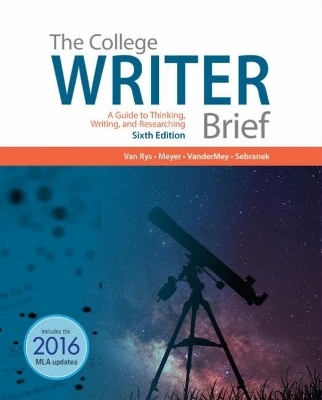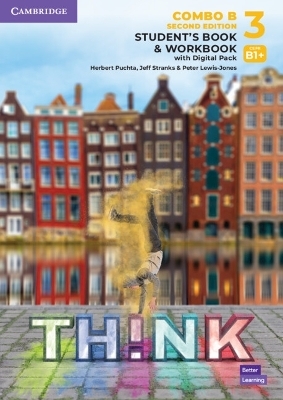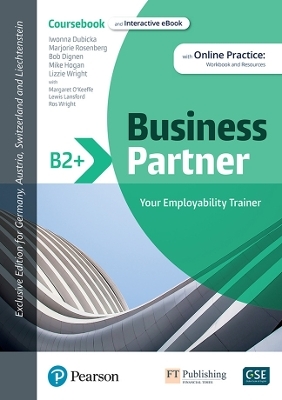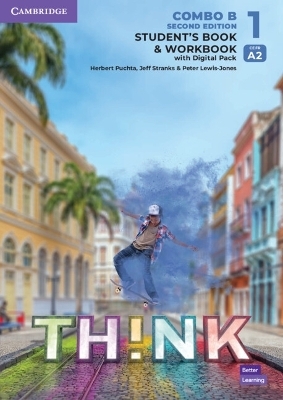
The College Writer
Wadsworth Publishing Co Inc
978-0-357-60016-0 (ISBN)
- Titel z.Zt. nicht lieferbar
- Versandkostenfrei innerhalb Deutschlands
- Auch auf Rechnung
- Verfügbarkeit in der Filiale vor Ort prüfen
- Artikel merken
Patrick Sebranek (M.A. University of Wisconsin, LaCrosse) taught English, speech, and multimedia classes for 16 years at Union Grove High School in Wisconsin. During that time, he served as the English department chair and worked on several district-wide projects, including a writing-across-the-curriculum program and a K-12 writing sequence. He has studied the works of James Moffett, Ken Macrorie, Linda Reif, Nancie Atwell, and many other contemporary educators dealing with writing and learning. Mr. Sebranek is an author and editorial director for the Write Source Educational Publishing House and works closely with teachers and educators on all new and revised handbooks and sourcebooks. Dr. Verne Meyer is an educator and businessperson. For nine years, he taught English in high schools in Michigan and Wisconsin. In addition, for fifteen years, he taught dramatic literature, theater history, and composition at Dordt University in Iowa. In 1977, partnering with Mr. Sebranek, Dr. Meyer co-founded Write Source Educational Publishing House, now a subsidiary of Houghton Mifflin Harcourt Supplemental. Dr. Meyer earned his B.A. from Calvin College, his M.A. from Marquette University, and his Ph.D. from the University of Minnesota. In addition to this text, he has co-authored a number of texts for college students, including THE COLLEGE WRITER'S HANDBOOK, COMP, THE BUSINESS WRITER, and WRITE FOR WORK. To meet the needs of students in grades 8 through 12, he has co-authored WRITERS INC, SCHOOL TO WORK, WRITE FOR COLLEGE, and a number of Write Source textbooks. Dr. Meyer's publications for businesspeople include WRITE FOR BUSINESS and EFFECTIVE EMAIL MADE EZ. Dr. Meyer is currently a contributing editor for Write Source and UpWrite Press. He is also a featured speaker in the School Improvement Network's instructional videos, Writing Across the Curriculum. Randall VanderMey is a professor in the department of English at Westmont College in Santa Barbara, California. He also has taught composition, literature, and technical writing at Iowa State University, Dordt College, and the University of Iowa. Dr. VanderMey earned his M.A. from the University of Pennsylvania, M.F.A. from the Iowa Writers' Workshop, and Ph.D. from the University of Iowa. He is a contributing editor and creative consultant for Write Source. Dr. VanderMey has received numerous fellowships, grants, and awards for his teaching and poetry. He has published two books of poems, GROWING SOUL: A SONG CYCLE, GOD TALK and CHARM SCHOOL: FIVE WOMEN OF THE ODYSSEY as well as a commissioned biography, MERIZON: THE GREAT JOURNEY. Dr. John Van Rys has taught composition, business writing, creative writing, and literature to college students for more than 30 years. He began his teaching career at Dordt University in Sioux Center, Iowa, before moving to Redeemer University in Hamilton, Ontario, in 2005. He earned his M.A. and B.A. from the University of Western Ontario and his Ph.D. from Dalhousie University. Today, Dr. Van Rys pursues scholarly work in Canadian literature, while also writing fiction and poetry. For more than 20 years, he has worked on writing-across-the-curriculum theory and practice, on connections between workplace and academic writing. He has also pursued strategies for strengthening varied literacies in students, from reading and research to visual literacy. Dr. Van Rys has applied his expertise, co-authoring various writing handbooks for students, from middle school to college. He has also co-authored an award-winning business-writing handbook for workplace professionals, WRITE FOR BUSINESS, with UpWrite Press.
Part I: RHETORIC: A COLLEGE STUDENT'S GUIDE TO WRITING.
1. Critical Thinking Through Reading, Viewing, and Writing.
Critical Thinking Through Reading. Responding to a Text. Summarizing a Text. Critical Thinking Through Viewing. Interpreting an Image. Evaluating an Image. Critical Thinking Through Writing. Practicing Modes of Thinking in Your Writing. Critical Thinking and Writing: Applications. Learning-Objectives Checklist.
2. Beginning the Writing Process.
The Writing Process: From Start to Finish. Understanding the Rhetorical Situation. Aiming for Writing Excellence. Understanding the Assignment. Developing a Topic. Collecting Information. Critical Thinking and Writing: Applications. Learning-Objectives Checklist.
3. Planning.
Revisit the Rhetorical Situation. Forming Your Thesis Statement. Using a Thesis to Pattern Your Writing. Developing a Plan or an Outline. Critical Thinking and Writing: Applications. Learning-Objectives Checklist.
4. Drafting.
Reconsider the Rhetorical Situation. Basic Essay Structure: Major Moves. Opening Your Draft. Developing the Middle. Ending Your Draft. Working with Sources. Critical Thinking and Writing: Applications. Learning-Objectives Checklist.
5. Revising.
Consider Whole-Paper Issues. Revising Your First Draft. Revising for Ideas and Organization. Revising for Voice and Style. Addressing Paragraph Issues. Revising Collaboratively. Using the Writing Center. Critical Thinking and Writing: Applications. Learning-Objectives Checklist.
6. Editing and Proofreading.
Strategies for Polishing Your Writing. Combining Sentences. Expanding Sentences. Checking for Sentence Style. Avoiding Vague, Weak, and Biased Words. Proofreading Your Writing. Critical Thinking and Writing: Applications. Learning-Objectives Checklist.
7. Submitting Writing and Creating Portfolios.
Formatting Your Writing. Submitting Writing and Creating Portfolios. Critical Thinking and Writing: Applications. Learning-Objectives Checklist.
8. One Writer's Process.
Angela's Assignment and Response. Angela's Planning.
Part II: READER: STRATEGIES AND SAMPLES.
9. Forms of College Writing.
Three Curricular Divisions. Writing in the Humanities. Writing in the Social Sciences. Writing in the Natural Sciences. The Rhetorical Modes. Critical Thinking and Writing: Applications. Learning-Objectives Checklist.
10. Narration, Description, and Reflection.
Strategies for Personal Essays. Brief Narratives: Anecdotes. Sample Personal Essays. Story Time: A True Story," by Brandalynn S. Buchanan. "Spare Change," by Teresa Zsuffa. "What I Learned in Prison," by James Kilmore. "The Muscle Mystique," by Barbara Kingsolver. "Finding Ashton," by Melissa Pritchard. Writing Guidelines. Critical Thinking and Writing: Applications. Learning-Objectives Checklist.
11. Definition.
Strategies for Definition Essays. Sample Definition Essays. "Economic Disparities Fuel Human Trafficking," by Shon Bogar. "Defining Mathematics," by Chase Vis. "Deft or Daft," by David Schelhaas. "Confessions," by Amy Tan. "Beginnings," by Susan Sontag. "On Excellence," by Cynthia Ozick. Writing Guidelines. Critical Thinking and Writing: Applications. Learning-Objectives Checklist.
12. Classification.
Strategies for Classification Essays. Sample Classification Essays. "Latin American Music," by Kathleen Kropp. "Why We Lift," by Hillary Gammons. "Four Sides to Every Story," by Stewart Brand. "The Lion, the Witch, and the Metaphor," by Jessica Siegel. Writing Guidelines. Critical Thinking and Writing: Applications. Learning-Objectives Checklist.
13. Process.
Strategies for Process Essays. Sample Process Essays. "Wayward Cells," by Kerri Mertz. "No Risky Chances," by Atul Gawande. "The Washing," by Reshma Memon Yaqub. "The Emancipation of Abe Lincoln," by Eric Foner. Writing Guidelines. Critical Thinking and Writing: Applications. Learning-Objectives Checklist.
14. Comparison and Contrast.
Strategies for Comparison-Contrast Essays. Sample Comparison-Contrast Essays. "Beyond the Polite Smile," by Janice Pang. "Why We Care About Whales," by Marina Keegan. "Journeys," by Barbara Kingsolver. "How the Internet Has Changed Bullying," by Maria Konnikova. Writing Guidelines. Critical Thinking and Writing: Applications. Learning-Objectives Checklist."
| Erscheint lt. Verlag | 7.1.2020 |
|---|---|
| Verlagsort | Belmont, CA |
| Sprache | englisch |
| Gewicht | 907 g |
| Themenwelt | Schulbuch / Wörterbuch ► Schulbuch / Allgemeinbildende Schulen |
| Geisteswissenschaften ► Sprach- / Literaturwissenschaft ► Sprachwissenschaft | |
| ISBN-10 | 0-357-60016-9 / 0357600169 |
| ISBN-13 | 978-0-357-60016-0 / 9780357600160 |
| Zustand | Neuware |
| Haben Sie eine Frage zum Produkt? |
aus dem Bereich


